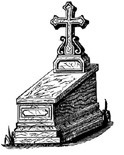
My Journey From Catholicism to Eastern Orthodoxy & Back
RETURNING TO THE BEDSIDE OF MY SUFFERING MOTHER
I was born in Iowa after the Second Vatican Council, and heard my mother sigh as she showed me pictures of the church in which I was baptized, saying “They took out all the beautiful things.” I came to manhood in a small college town in Oregon that prided itself on liberalism, bike trails, and arts festivals. It offered one food co-op, one hippie bakery, one New Age bookstore, assorted coffeehouses, and the second largest Catholic parish in the state. Despite thousands of Catholics around me, four Sunday Masses, daily Mass, and weekly CCD, I received little grounding in Catholicism, and even opposition to it from those entrusted and consecrated to its propagation. So I came to leave the Catholic Church and enter, with all fervor and hope, the Orthodox Church.
From early childhood I had been taken by the depth and beauty of the biblical narrative, the Crucifixion (that most Catholic image), and the silence and peace attainable in a house of God. To my young heart, Catholicism was something good, wonderful, and deep! But in time I recognized that many of my religious educators were not so taken. I heard about saints, but their statues were kept out of the way, in a classroom, not in the church. I never heard about the Rosary, but have a clear memory of a Passover Seder that we had to enact. One head of religious education was anti-nuke (I knew then) and pro-choice (I recently learned); she brought in speakers to tell us about Leo Buscaglia and told us to watch Footloose. Another, a worldly nun, told me not to read Butler’s Lives of the Saints because it was not accurate.
The Catholic Church seemed not to fulfill what it had taught and held true. There was little — if any — visible piety or devotion. No one cared about the divine, the spiritual, the ineffable. But I knew there was depth to life, and I would have it. And as the gulf between what I expected to find in the Church and the desiccated reality widened, I sought something else.
I had for years been reading the histories of both Russia and Byzantium, and knew that they had their own Christianity: Orthodoxy. It was a religion of purple and gold, of vestments like the raiment of angels, of incense and chant, of bearded clerics and veiled women. The history was exotic, romantic, bloody, and sweeping, like the Old Testament. Its art and architecture were sacral, yet earthy, not plastic or obscure. To a hungry young man, it was most nourishing.
You May Also Enjoy
Fourteen American women tell how they found their way to the Church via a need for Church authority and the discovery that holiness is a journey.
We studied the issues in both Scripture and history and came to the conclusion that the East was correct on both the papacy and the filioque.
Snyder, baptized a Lutheran, entered prison as a nonbeliever but died less than a year later as a Roman Catholic. Was her conversion sincere?

